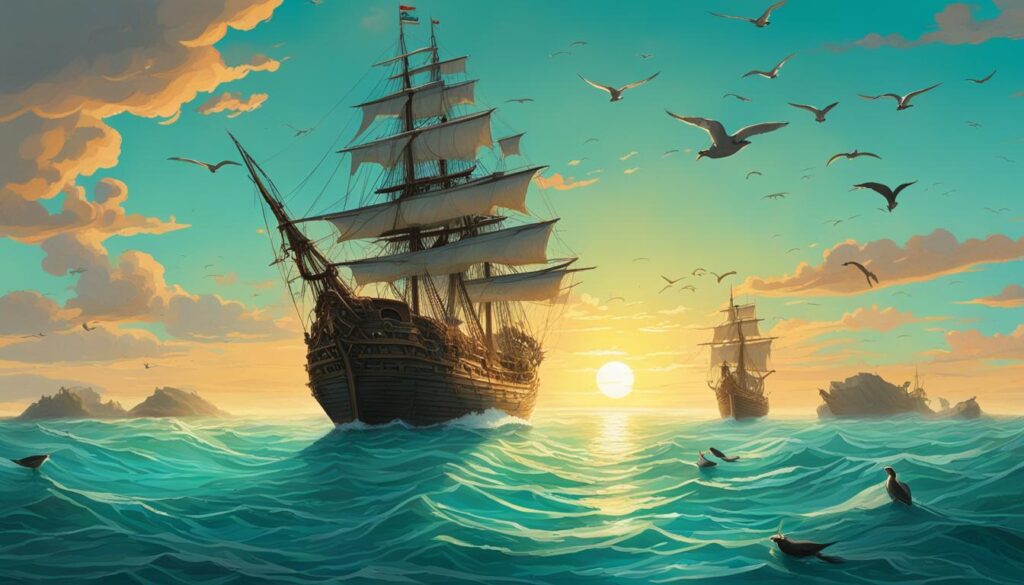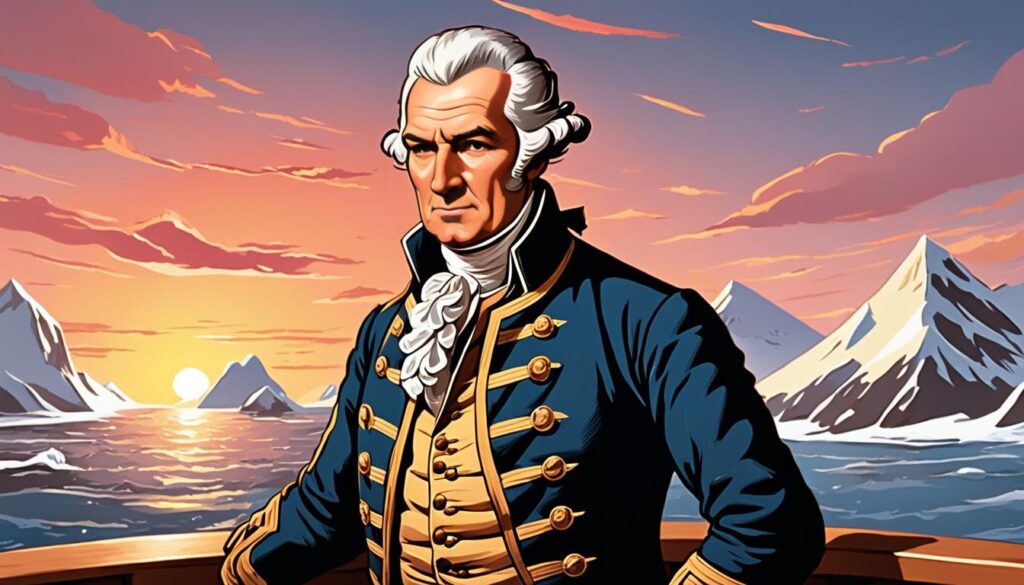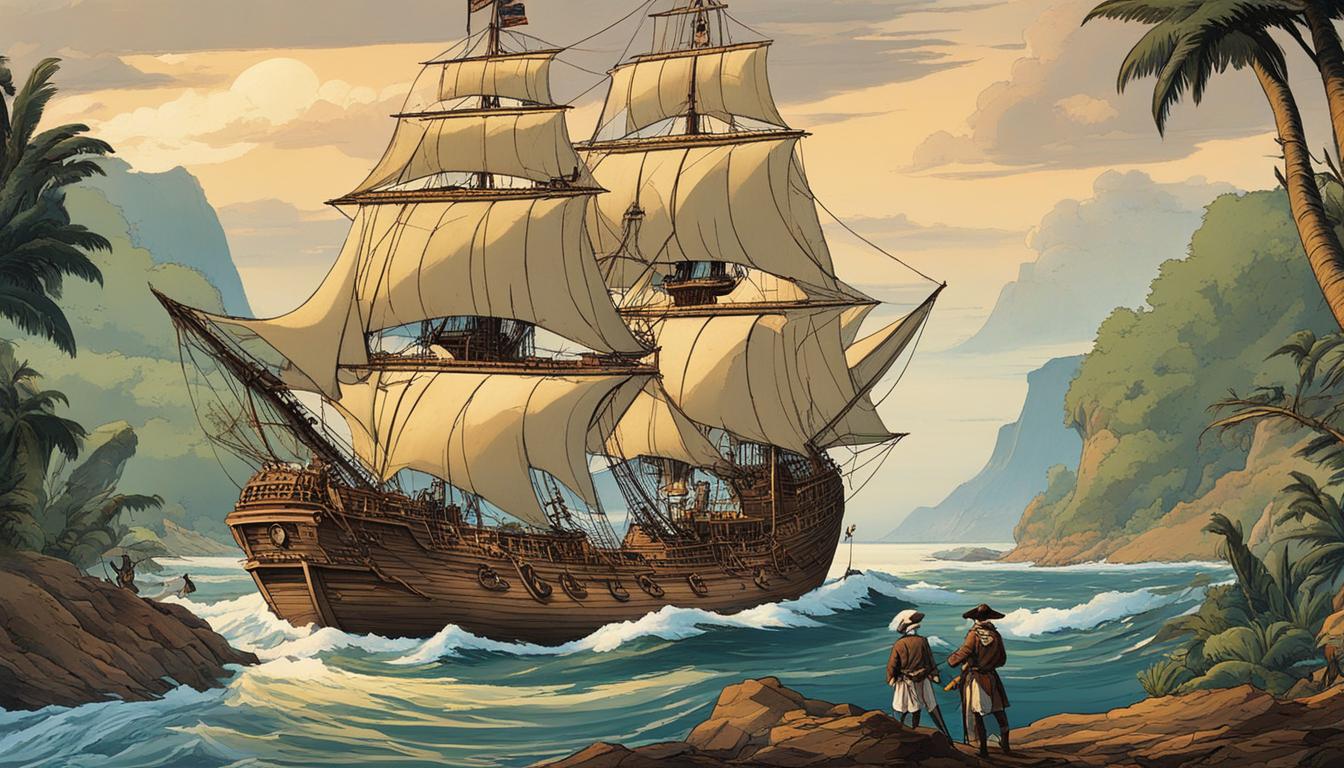Captain James Cook was a renowned explorer whose expeditions fundamentally shaped the world we live in today. In the book “Farther Than Any Man” by Martin Dugard, we gain a unique insight into Cook’s life, exploring his rise to fame and his tragic demise.
This book offers a detailed and comprehensive summary of Captain Cook’s expeditions, allowing readers to gain a better understanding of his impact on history and scientific knowledge. Martin Dugard’s portrayal of Cook is one that is both informative and captivating, making this book an essential read for anyone interested in exploration and adventure.
Background of Captain James Cook
Captain James Cook was born on October 27, 1728, in the village of Marton, North Riding of Yorkshire, England. One of eight children, Cook grew up on a farm where he received only a basic education. At 18 years old, he left home and began working for a shipowner in Whitby.
In 1755, Cook joined the Royal Navy and quickly rose through the ranks due to his exceptional navigation skills. His early naval assignments involved surveying and charting under the direction of the Admiralty. Cook’s experience and expertise as a navigator would later prove critical to his success as an explorer.
Between 1768 and 1779, Captain Cook embarked on three major voyages of exploration to the Pacific Ocean, earning him worldwide recognition and cementing his place in history as one of the greatest navigators of all time. Through his voyages, Cook charted vast stretches of previously unexplored territory, including the east coast of Australia and the Hawaiian Islands.
Notably, Cook was able to keep his crew healthy and well-fed during long sea voyages, thanks to his emphasis on nutrition and hygiene. This approach helped reduce the number of casualties from scurvy and other diseases.
“No man ever did more to make his name and that of his country immortal.” – Sir Joseph Banks, botanist and member of Cook’s crew.
Captain Cook’s First Voyage
Captain James Cook’s first voyage was a pivotal moment in the history of exploration. In 1768, he set sail from England aboard the Endeavour with the goal of observing the transit of Venus from the South Pacific. However, Cook was also tasked with exploring the region, with orders to search for the fabled southern continent.
Despite facing numerous challenges, including storms, navigational difficulties, and hostile encounters with indigenous peoples, Cook managed to circumnavigate New Zealand and chart the east coast of Australia, claiming it for the British Empire. He also collected valuable data on the flora, fauna, and cultures of the region.
The significance of Cook’s first voyage cannot be overstated. It marked the beginning of a new era of exploration, opening up new trade and colonization opportunities for European powers. It also paved the way for Cook’s subsequent voyages and cemented his legacy as one of the greatest explorers in history.
Captain Cook’s Second Voyage
Captain James Cook’s second voyage was a significant exploration of the Pacific Ocean, lasting from 1772 to 1775. The primary aim of the voyage was to search for the hypothetical southern continent of Terra Australis, determined by cartographers to balance the landmasses in the Northern Hemisphere. Cook sailed aboard the HMS Resolution and was accompanied by the HMS Adventure, captained by Tobias Furneaux.
The expedition took Cook and his crew through multiple islands in the South Atlantic and South Pacific. Cook was the first European explorer to set foot on the islands of South Georgia and Kerguelen in the South Indian Ocean.
The second voyage marked several highlights, including the discovery of the societies of Tonga and Easter Island, charting the coastline of New Zealand, and reaching the farthest south point any ship had ever sailed at that time. Cook encountered and traded with indigenous peoples throughout the Pacific, establishing a relationship that would lead to future colonization.
The HMS Resolution underwent repairs at Dusky Sound in New Zealand, providing Cook with an opportunity to study botany and wildlife in a unique environment. His findings contributed to scientific knowledge and the understanding of the region.
Despite the successes of the voyage, Cook faced several obstacles, including the deaths of several of his crew members due to scurvy and tensions with members of the crew. These challenges, along with the dangers of exploring unknown waters, made the second voyage a complex and demanding expedition.

In the end, Cook’s second voyage significantly contributed to the geographical knowledge of the Pacific, establishing routes for trade and colonization. It proved him as a skilled navigator and leader, cementing his legacy as one of the greatest explorers in history.
Captain Cook’s Third Voyage
During Captain James Cook’s third voyage, he set sail from Plymouth in July 1776 on a mission to explore and map the Pacific Ocean, as well as to search for the elusive Northwest Passage. Cook’s ships, HMS Resolution and HMS Discovery, made stops in Tahiti and the Tonga Islands before arriving in Hawaii in January 1779.
While in Hawaii, Cook encountered resistance from the islanders, who were weary of the foreigners and their demands for provisions. Tensions rose, and on February 14th, 1779, an altercation broke out that resulted in the death of Captain Cook and several of his men.
“Thus fell the pride of European discovery. He had crossed and recrossed the largest ocean in the world and had finally been defeated by the spears of savages armed with little more than fish hooks.” -Martin Dugard, Farther Than Any Man
Cook’s death was a tragic end to his illustrious career as an explorer. However, his legacy lives on through his scientific observations, mapping, and expansion of the world’s geographical knowledge.
Martin Dugard’s Perspective on Captain Cook
Martin Dugard’s book “Farther Than Any Man” offers a unique perspective on the life and legacy of Captain James Cook. Dugard presents Cook not just as a skilled navigator and explorer, but as a complex figure with both admirable qualities and flaws. Through his meticulous research and engaging writing style, Dugard provides readers with a deeper understanding of Cook’s expeditions and their significance.
Dugard’s book review is not without criticisms, however. Some have criticized his portrayal of Cook as overly sympathetic, failing to acknowledge the negative impact of his expeditions on indigenous populations. Despite this, Dugard’s work is a valuable contribution to the extensive literature on Captain Cook.
“Captain Cook was not the first European to sail the Pacific, but he was the most effective and imaginative,” writes Dugard. “He was at once explorer, cartographer, surveyor, naturalist, diplomat, and warrior. Cook was but a man, and a flawed one at that. But his spirit of discovery remains as such a powerful legacy that we can only wonder what else he might have accomplished had he lived longer.”
Overall, Martin Dugard’s perspective on Captain Cook offers a nuanced, thought-provoking exploration of one of history’s greatest explorers. His book is a must-read for anyone interested in the life and legacy of Captain James Cook.
The Impact of Captain Cook’s Expeditions
It is difficult to overstate the impact that Captain James Cook’s expeditions had on the world. His impressive voyages not only expanded geographical knowledge but also contributed to a deeper scientific understanding of the natural world. Cook’s legacy lives on today, as many of the places he visited and named remain unchanged.
Among the most significant impacts of Cook’s expeditions is the increased understanding of the Pacific Ocean. Before Cook’s arrival, Europeans had little knowledge of the vast Pacific and its numerous islands. Cook’s voyages greatly expanded our understanding of the region, and his navigational methods and charts remain influential.
The lasting impact of Captain Cook’s legacy can also be seen in the societies and cultures he encountered. While some may argue that his interactions with indigenous peoples were often problematic and shaped by colonialism, others recognize that Cook’s voyages exposed Europeans to new worldviews and ways of life. The impact of these encounters cannot be understated, and they continue to be the subject of ongoing research and debate.
“Throughout much of the world, James Cook is revered as a legendary figure, standing at the forefront of exploration, science and the opening up of new lands,” writes Martin Dugard in Farther Than Any Man.

Cook’s impact on the scientific world cannot be ignored either. His expeditions contributed to a better understanding of botany, zoology, and astronomy, and the data and findings he collected remained influential for decades.
In summary, Captain James Cook’s expeditions had a profound impact on the world. His contributions to geographical and scientific knowledge, as well as his encounters with new cultures and peoples, have left a lasting legacy that continues to be studied and appreciated today.
Critiques and Controversies Surrounding Captain Cook
While Captain James Cook was celebrated for his remarkable achievements as an explorer and navigator, his expeditions were not without controversy. Some critiques center around Cook’s interactions with indigenous peoples during his voyages. There have been accusations of violence and exploitation toward the people he encountered, particularly in the Pacific region.
Additionally, there have been debates regarding the colonial implications of Cook’s voyages. Some argue that his expeditions were part of a larger Western imperial agenda, with the goal of claiming territory and resources for European powers. Others assert that Cook’s influence paved the way for future colonization and exploitation of indigenous peoples.
Despite the critiques and controversies surrounding Captain Cook and his expeditions, it is important to acknowledge the complexities of his historical legacy. Understanding the social and political context of his voyages is crucial for a nuanced view of his impact on the world.
Indigenous Perspectives
It is essential to consider Indigenous perspectives and their understanding of Cook and his voyages. Many Indigenous communities have criticized the glorification of Cook and the portrayal of his voyages as heroic and noble. They assert that this overlooks the harm and trauma inflicted upon them by colonialism and the legacy of these voyages.
“He was a violent invader… Cook’s arrival heralded the end of our civilization as we knew it.” – Maori activist, Tina Ngata
| Controversies | Criticisms |
|---|---|
| Cook was involved in deadly skirmishes with indigenous peoples during his voyages, particularly in Hawaii, where he was killed. | Cook’s interactions with indigenous peoples were rooted in cultural misunderstandings and language barriers. |
| Cook’s voyages contributed to the spread of disease among indigenous populations, resulting in devastating consequences. | The transmission of disease was unintentional and a result of the lack of understanding of how germs spread. |
| Cook’s voyages were part of a larger colonial enterprise to claim territory and resources for Western powers. | Cook’s voyages had scientific and geographical goals, and he was not directly involved in the colonization of territories. |
While there are valid criticisms and controversies surrounding Captain Cook and his voyages, it is important to consider these issues within their historical context. Examining Cook’s impact on indigenous peoples and broader colonial history can provide a deeper understanding of the historical legacies that continue to shape the world today.
Exploring the Themes in “Farther Than Any Man”
In “Farther Than Any Man,” Martin Dugard explores several recurring themes throughout the book. One of the most prominent themes is that of exploration itself. The book dives deep into the psyche of Captain James Cook and his motivations for exploration, as well as the almost obsessive drive that led him to push farther and farther into uncharted territories.
Another important theme is that of ambition, both in Cook himself and in those who supported his expeditions. Cook’s ambition to explore new lands was fueled by a sense of curiosity and a desire for discovery and knowledge.
Additionally, Dugard discusses the human fascination with the unknown, including the risks and rewards that come with venturing into uncharted territories. He also examines the cultural barriers that Cook faced, along with his interactions and conflicts with indigenous peoples during his voyages.
Overall, Dugard’s analysis in “Farther Than Any Man” provides a compelling exploration of the themes that underpin Captain James Cook’s expeditions and the motivations behind exploration.
Reception and Awards
Since its publication, “Farther Than Any Man” has garnered critical acclaim and received various awards, cementing its place as a compelling and informative read. The book has been praised for its vivid portrayal of Captain James Cook and his expeditions, providing readers with valuable insights into the era of exploration and its impact on history.
| Award | Year | Category |
|---|---|---|
| Dayton Literary Peace Prize | 2001 | Non-fiction |
| Los Angeles Times Book Prize | 2002 | Biography |
| Pacific Northwest Booksellers Association Award | 2002 | Non-fiction |
These accolades attest to the outstanding quality and relevance of the book, which has been praised not only for its historical accuracy but also for its captivating narrative and engaging style. Readers have also expressed their appreciation for the book, with many noting its ability to bring the past to life through rich and descriptive storytelling.
In summary, “Farther Than Any Man” has been widely praised for its insightful portrayal of Captain James Cook and his expeditions, earning critical acclaim and various awards. Its vivid narrative and historical accuracy have captured the attention of both readers and critics, making it an essential read for anyone interested in the era of exploration and its impact on history.
Historical Context of Captain James Cook
To understand the significance of Captain James Cook’s expeditions, it’s essential to examine the historical context in which he lived. Cook was born in 1728, a time when Europe was experiencing significant political and economic changes. The mercantile period was coming to an end, and European nations were actively searching for new markets and resources beyond their territories. As a result, explorers like Cook were sent to identify new lands for exploration, colonization, and trade.
Cook’s expeditions also coincided with the Age of Enlightenment, a period of scientific revolution and inquiry. There was a growing interest in exploring the natural world, and Cook’s voyages provided new insights into the Pacific Ocean and its complex ecosystems.
*Image related to the historical context of Captain James Cook*
Furthermore, Cook was part of the broader colonial context in which European nations sought to expand their empires and exert their dominance over other civilizations. Cook’s expeditions were not without controversy, as they often involved interactions with indigenous peoples. These events led to debates about the ethics of exploration and colonization, as well as discussions about the impacts of these actions on the world as a whole.
In conclusion, understanding the historical context of Captain James Cook’s expeditions is essential in comprehending their significance and impact. It provides insights into the motivations behind exploration, scientific inquiry, and colonization, and sheds light on the controversies and debates that still surround Cook’s legacy today.
Conclusion
Overall, “Farther Than Any Man” by Martin Dugard provides a comprehensive and engaging account of Captain James Cook’s life and expeditions. Dugard’s vivid storytelling and in-depth research make this book a must-read for history buffs and anyone interested in exploration.
The biography offers insight into Cook’s achievements, challenges, and legacy, highlighting his role in expanding geographical knowledge and scientific understanding. Dugard also explores themes such as ambition, curiosity, and the human drive to explore the unknown, providing a well-rounded perspective on the renowned explorer.
“Farther Than Any Man” has received critical acclaim and recognition, cementing its place as one of the best biographical works on Cook. It offers a fascinating historical context for understanding the era and motivations behind exploration, as well as the colonial implications of Cook’s voyages.
In conclusion, this book is a valuable addition to any library and is recommended for anyone interested in history, exploration, or biography. Dugard’s insightful analysis and compelling storytelling make “Farther Than Any Man” a captivating read from start to finish.



